How to Build Self-Confidence and Develop Self-Esteem for Men
Self-esteem isn’t something you’re simply born with.
It’s something you build, challenge, and refine—especially as a man navigating a world full of pressure, comparison, and uncertainty.
I grew up with severe asthma and Tourette syndrome.
I was overweight and slow, and I struggled with my body composition throughout high school.
I wasn’t naturally confident, and I often felt like I didn’t belong.
But that changed after high school, when I got the opportunity to attend a prep school away from home and learn from a coach/mentor who supported me and changed my perspective on myself and my life.
That was the turning point—physically, mentally, and emotionally.
What changed?
I stopped letting the world define me and started building a version of myself I could respect.
I leaned into fitness, studied psychology, and committed to improving my mind and body.
My self-esteem started to grow—not because I “faked confidence,” but because I earned it.
I worked for it.
And that’s what most people get wrong.
What is True Self-Confidence for Men?
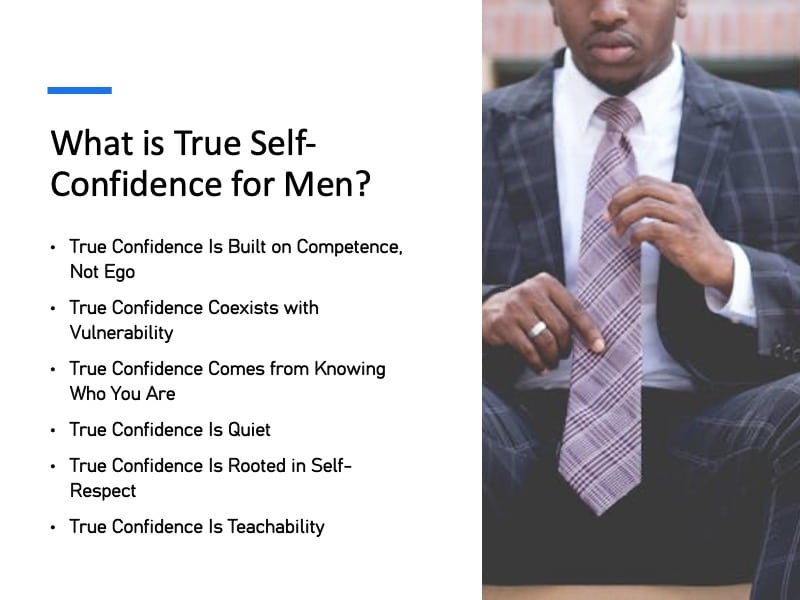
True self-confidence for men is not loud, aggressive, or boastful—it’s calm, grounded, and earned.
It’s not about believing you’re better than others but believing you’re capable, worthy, and prepared to face life as you are, with nothing to prove and nothing to hide.
True Confidence Is Built on Competence, Not Ego
Real self-esteem for men stems from doing the work—consistently, over time.
It comes from lifting weights until your body changes, speaking up even when your voice shakes, and learning new skills until you’ve mastered them.
- Ego is insecure and constantly needs validation.
- Confidence is secure because it’s based on evidence.
A self-confident man doesn’t need to dominate the room—he owns his presence without needing attention.
True Confidence Coexists with Vulnerability
Contrary to outdated views of masculinity, vulnerability is not a threat to confidence—it’s a sign of strength.
A truly confident man can say “I don’t know,” “I need help,” or “I made a mistake” without shame.
He isn’t fragile in the face of criticism because his identity isn’t built on perfection.
Confidence without vulnerability is bravado. Vulnerability without confidence is insecurity. Balance both, and you get inner strength.
True Confidence Comes from Knowing Who You Are
When a man knows his values, understands his purpose, and lives in alignment with them, he becomes unshakeable.
Self-awareness is the foundation of self-confidence.
He doesn’t need to compare or conform because he’s living a life that makes sense to him.
Confidence isn’t found in becoming someone else—it’s found in becoming fully yourself.
True Confidence Is Quiet
Real confidence doesn’t need to announce itself. It doesn’t require constant reassurance or applause.
It allows others to shine, it listens before speaking, and it’s more concerned with substance than appearance.
Confident men don’t puff up their chests—they stand firm in storms.
True Confidence Is Rooted in Self-Respect
A confident man respects his time, energy, and body.
- He sets boundaries.
- He eats well, trains hard, sleeps enough, and doesn’t chase short-term pleasure at the cost of long-term peace.
- He makes choices that align with the man he wants to become.
True Confidence Is Teachability
The most confident men are also the most coachable.
- They don’t assume they know everything.
- They seek feedback, they adapt, and they grow.
That willingness to learn is a sign of internal security, not weakness.
Bottom line: True self-confidence isn’t about dominating others—it’s about mastering yourself. It’s not a trait you’re born with; it’s a skill you build. And it becomes one of the most powerful forces in your life when it’s rooted in purpose, discipline, humility, and truth.
Why is it Difficult for Men to Build Self-Esteem?
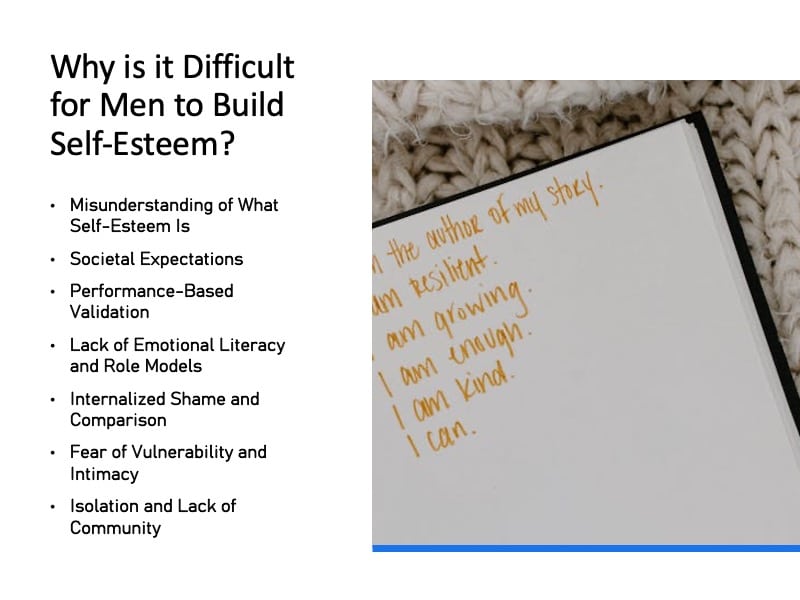
Building self-esteem for men is particularly difficult because of a complex intersection of cultural, psychological, and biological factors that discourage vulnerability, self-reflection, and emotional honesty—traits that are essential for cultivating genuine self-worth.
Misunderstanding of What Self-Esteem Is
Self-esteem isn’t arrogance or overconfidence.
It’s the quiet belief that you are enough, as you are.
Many men confuse confidence (which is situational) with esteem (which is internal and foundational).
Without understanding this difference, they chase fleeting boosts of confidence without addressing their deeper sense of self-worth.
Societal Expectations
Men are often conditioned from a young age to equate their worth with strength, dominance, and emotional stoicism.
This creates a rigid standard of masculinity where asking for help, expressing vulnerability, or admitting insecurity is seen as weakness.
As a result, many men learn to suppress their emotions rather than confront them, which hinders the development of true self-esteem.
Performance-Based Validation
Many men derive their sense of value from what they do—their careers, physical strength, income, or achievements—rather than who they are.
While accomplishments can temporarily boost confidence, they don’t build sustainable self-esteem.
When self-worth is tied solely to success or status, any setback can trigger deep insecurity and self-doubt.
Lack of Emotional Literacy and Role Models
Boys and young men are rarely taught how to talk about their feelings in constructive ways.
Emotional development is often stunted by phrases like “man up” or “boys don’t cry,” which discourage introspection.
Without emotionally intelligent male role models, many men don’t learn how to process or communicate their internal struggles, making self-reflection—and thus self-esteem—more elusive.
Internalized Shame and Comparison
Social media and modern life amplify comparison and perfectionism.
Men may constantly measure themselves against idealized images of success, masculinity, or attractiveness.
This leads to internalized shame, especially if they feel they’re not “enough” in key areas like career, physique, or relationships.
Fear of Vulnerability and Intimacy
Developing self-esteem for men requires facing insecurities and admitting areas of weakness.
But vulnerability can feel threatening to men raised with the idea that they must always be “in control.”
This fear of being judged or seen as weak keeps many men from engaging in the kind of personal growth work that strengthens self-esteem.
Isolation and Lack of Community
Many men lack deep, supportive friendships.
Research consistently shows that adult men have fewer close confidants than women, which contributes to loneliness and a lack of emotional support.
Self-esteem thrives in environments where we feel understood and accepted—something men often don’t experience.
Rethinking Toughness: A Book That Changed My Perspective
One book I highly recommend for any man struggling with self-esteem or confidence is Do Hard Things by Steve Magness.
It fundamentally redefines what it means to be “tough.”
Magness rejects the outdated idea of toughness as pretending you’re not hurting or pushing through blindly.
Instead, he teaches that real toughness comes from embracing discomfort, listening to your body, and understanding your emotions.
That’s real resilience.
It’s what self-esteem is built on—not arrogance, but adaptability and authenticity.
His four pillars—ditch the façade, listen to your body, respond instead of react, and transcend discomfort—align perfectly with what I’ve learned through years of professional basketball, training, and self-growth.
Last update on 2025-04-15 / This article includes affiliate links/Images via Amazon Product Advertising API. I may earn commissions on purchases made through these links.
Self-Esteem vs. Self-Efficacy: Why the Difference Matters
To build confidence and self-esteem that lasts, you need to understand the difference between self-esteem and self-efficacy.
- Self-esteem is how much you value yourself.
- Self-efficacy, on the other hand, is your belief in your ability to achieve goals or handle specific tasks.
True self-esteem for men is the combination of knowing who you are (identity and purpose) and believing in what you can do (capability and execution).
When you understand this, you stop relying on external validation and start creating your own inner compass.
Evidence-Based Tips for Building Self-Efficacy (Confidence in Your Abilities)

Improving self-efficacy requires actionable, consistent effort. Research supports these strategies for developing stronger belief in your own capabilities:
Set Achievable, Meaningful Goals
Start small and specific.
For example: “Run for 10 minutes every Monday, Wednesday, and Friday.” Track your progress.
Every small win builds belief in your ability to take control of your life.
Setting SMART Goals is an excellent foundation for building self-esteem for men.
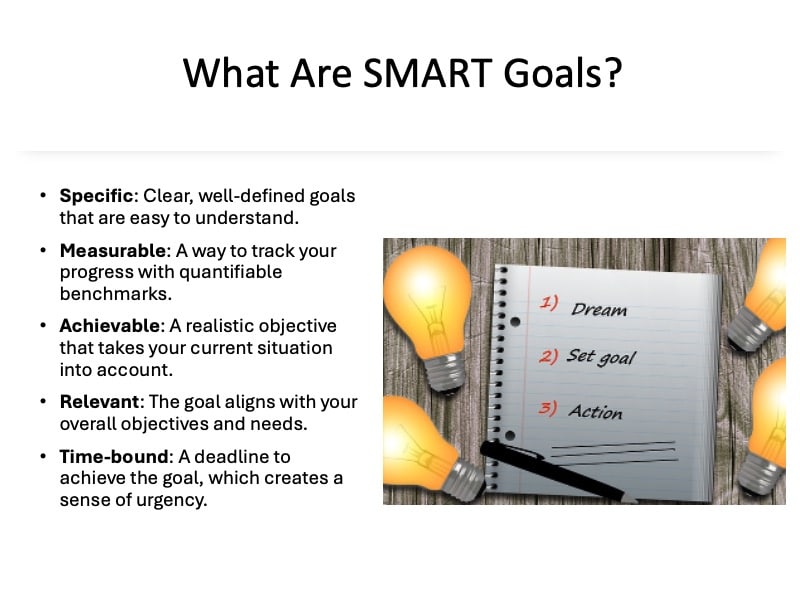
Break Big Goals Into Smaller Steps
This reduces overwhelm and provides frequent milestones.
Instead of “get in shape,” start with “go to the gym 3x this week.”
Each step proves you can follow through and will help you develop self-efficacy.
Visualize Success
Spend a few minutes daily visualizing yourself succeeding—completing a workout, acing a presentation, or handling stress with composure.
Visualization primes your mind for performance, and will allow you to handle distractions, roadblocks, and setbacks as they come.
Reflect on Past Wins
Keep a journal of situations you overcame.
Remind yourself of challenges you’ve already conquered.
These are your personal proof points of resilience.
Learn From Failure
Mistakes are part of mastery.
Reframe setbacks as lessons, not indicators of inadequacy.
Growth requires friction.
Surround Yourself With Support
Positive relationships help you believe in yourself.
Limit time with people who constantly criticize or undermine you.
Seek those who want to see you win.
Practical Strategies for Improving Self-Esteem in Men
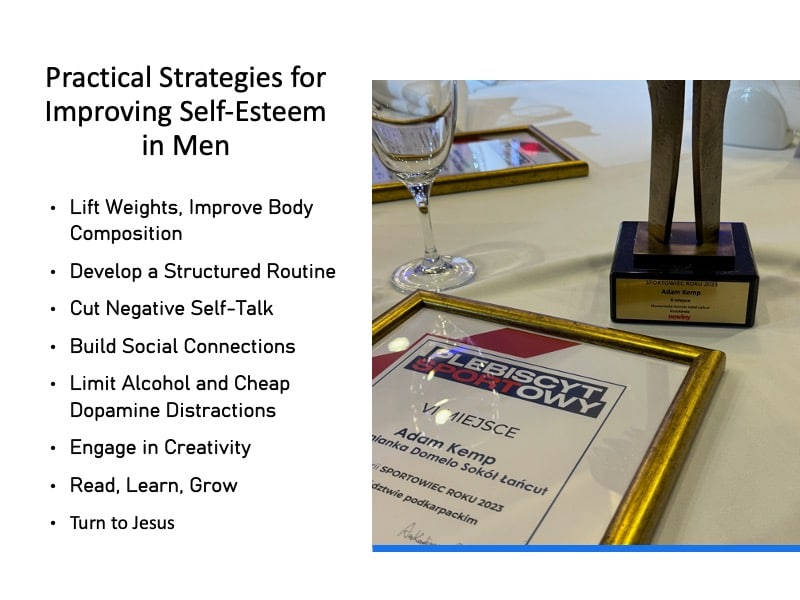
While self-efficacy builds belief in your abilities, self-esteem is about believing you are worthy of good things—no matter what. Here’s how to build both in a way that feels authentic and lasting:
Lift Weights, Improve Body Composition
Improving your physique through resistance training is one of the most direct ways to build self-esteem.
When you sculpt your body, you transform how you see yourself and how you feel.
This isn’t about vanity—it’s about mastery, consistency, and physical self-respect.
Whether you are a skinny guy trying to build muscle, a bigger guy trying to lose weight, or someone in between, lifting weights and overcoming the challenges associated with it will improve your self-esteem.
You will even learn to overcome new challenges, as it may take some time to develop body confidence after weight loss or understand the realization it is difficult to build muscle fast.
You don’t have to get a six-pack and a conventionally shredded, aesthetic body, but you should work towards and achieve your dream body.
If you begin strength training and improve your body composition, you will overcome hurdles and develop self-confidence.
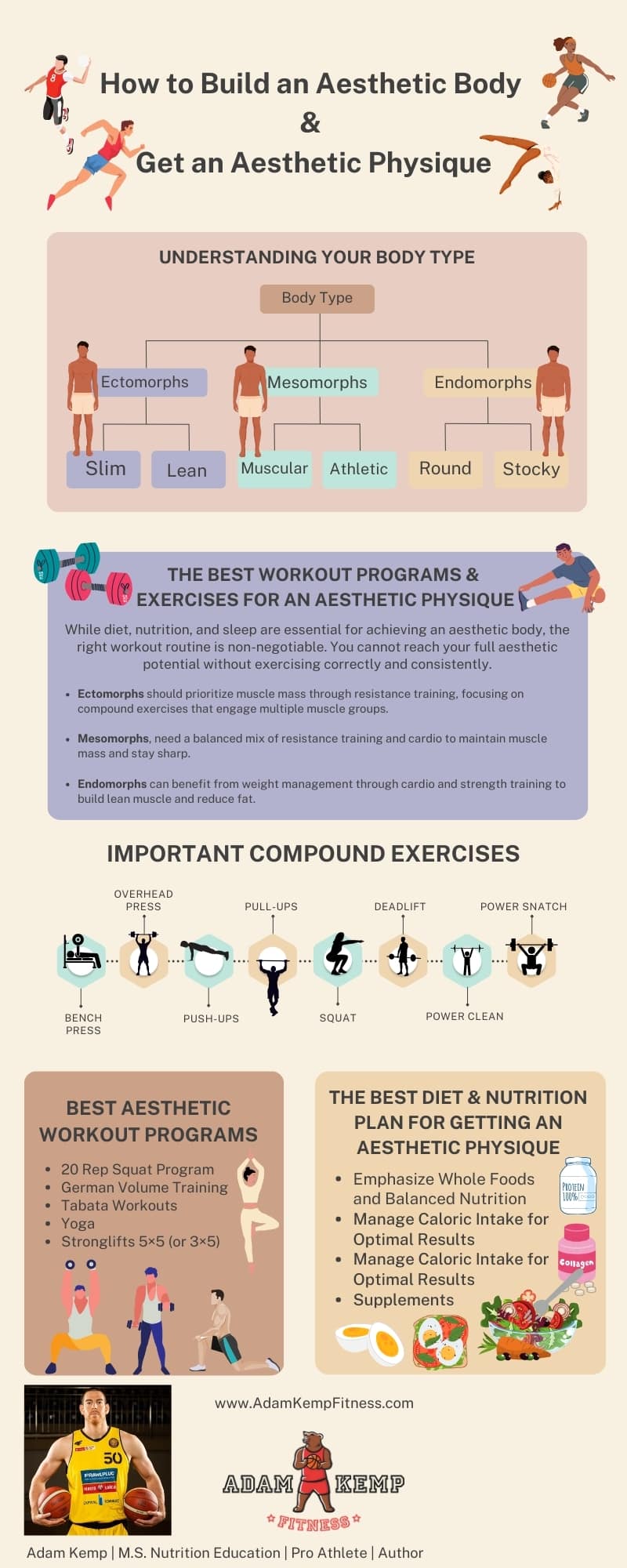
Develop a Structured Routine
Routine creates stability.
When you wake up, move your body, eat well, sleep properly, and create consistent habits, you signal to your brain that you’re someone worth taking care of.
Cut Negative Self-Talk
Name your inner critic.
Call it out.
Talk to yourself like you’d talk to a close friend or a younger brother.
Compassion doesn’t weaken you—it makes you stronger and more resilient.
Build Social Connections
Join a group, volunteer, or play a sport.
Shared purpose and meaningful relationships are essential for mental health.
Isolation kills self-esteem; connection builds it.
Limit Alcohol and Cheap Dopamine Distractions
Alcohol, junk food, and endless scrolling distance you from yourself.
Experiment with cutting back and feel the difference in clarity and self-worth.
Engage in Creativity
Learn an instrument, draw, write, or try a new hobby.
Creation breeds confidence.
You don’t have to be “good” at it—just consistent.
Read, Learn, Grow
Invest in knowledge that helps you understand yourself and the world.
Books like Do Hard Things, Atomic Habits, The Organized Mind, The Art of War, or The Daily Stoic rewire your brain for clarity and strength.
Last update on 2025-04-15 / This article includes affiliate links/Images via Amazon Product Advertising API. I may earn commissions on purchases made through these links.
Turn to Jesus

Finding faith, reading the Bible, and praying have been crucial parts of my personal self-esteem journey.
Through Christianity, I learned that self-worth doesn’t come from likes, money, or approval.
It comes from knowing you’re part of something bigger—created with purpose, even in suffering.
Jesus was perfect, and yet He was rejected and crucified.
That truth helped me understand that external judgment doesn’t determine internal worth.
If you’re constantly chasing validation from people, you’ll never feel fulfilled.
Faith helped me find confidence in my identity beyond performance or appearance.
Final Thoughts: Self-Esteem is Built, Not Bestowed
Building self-esteem for men is one of the hardest things to do as a man—and that’s exactly why you should do it.
Most people don’t.
They hide, distract, or pretend.
But if you put in the work—physically, mentally, emotionally, and spiritually—you’ll become someone you’re proud to be. That’s real confidence. That’s real toughness.
And no one can take that away from you.




